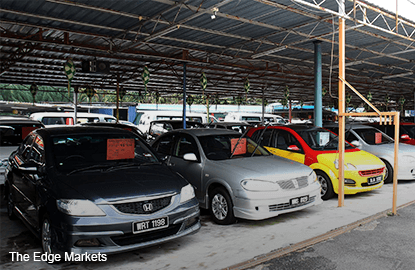
KUALA LUMPUR (Oct 12): A planned First Car Buyer Scheme may create a temporary uptick in car sales but could eventually result in a sharp drop in volume and overhang in the market, according to MIDF Research.
In a report today, the research house pointed at the massive defaults on loan instalments Thailand witnessed under its first car buyer scheme in 2012 as a "lesson from the past".
"Manufacturers and second hand dealers had to contend with finance companies overloaded with repossessed cars and ultimately, a loss of resale value for the cars," the report said.
In 2012, Thailand spent US$2.5 billion (RM10.46 billion) for the scheme, which involved tax refunds for first-time car buyers purchasing Eco Car qualified models. The country experienced a temporary boost of 81% to total industry volume (TIV) while production grew 68% throughout the period.
While it benefited some 1.2 million Thai car buyers, between 100,000 and 200,000 buyers defaulted on loan instalments, according to World Bank estimates.
Recent news flow has suggested the First Car Buyer Scheme may be implemented under the upcoming Budget 2017, with an excise duty exemption for selective locally assembled cars.
However, MIDF expected the spending for such a scheme to be higher than Thailand's 100,000 baht (RM10,000) at an estimated RM15,000–RM18,000 per car.
"Since the scheme looks likely to be borne by the Government, it basically means the Government will have to forgo some of its revenue from import or excise duties," the report added.
Although revenue from such duties was estimated to account for only around 1.4% of government revenue, 75% of total tax collection from vehicle sales were attributed to excise duties.
Neutral outlook on Malaysian automotive sector
The research house opined that the national A or B segments, which entail high localisation rates of 80% to 90%, suggested little room for significant cost savings from the excise duty exemption.
This is despite their projection that overall industry volumes were likely to be swayed since A and B segment cars account for more than 50% of TIV.
"Locally assembled models with low localisation rates will benefit the most and will likely see the most price cuts effectively, if all the duty savings are passed on to the consumer," analyst Hafriz Hezry noted.
MIDF maintained its "neutral" stance on the automotive sector with Berjaya Auto Bhd as their top pick in the sector with a target price of RM2.50 per share.
An attractive 7% dividend yield, further market share wins and recovery in manufacturing earnings were cited as catalysts as well as the potential listing of Berjaya Auto Philippines.
Meanwhile, it remained neutral on both UMW Oil & Gas Corp Bhd and Tan Chong Motor Holdings Bhd.
UMW was expected to face weakness in its auto division for the third quarter of 2016 as the impact of the new Hilux fizzles out and several end-of-life models run out.
Tan Chong's balance sheet was increasingly stretched as a result of the demand downcycle, the research house said.